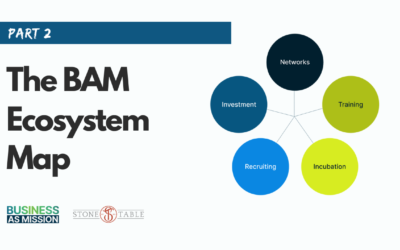Principles of Biblical Entrepreneurship: Lessons from Matthew 6:33

Principles of Biblical Entrepreneurship: Lessons from Matthew 6:33
Entrepreneurship is a tough assignment. There are many challenges that business owners face daily. Through our “Principles of Biblical Entrepreneurship” letters, I hope that you are encouraged to find God’s peace as He walks alongside you throughout the process.
Today we are going to be looking at some principles of Biblical entrepreneurship straight from the Scriptures. This simple analysis of one passage in the Bible will help you to set your heart on the right path to follow Christ throughout the endeavor of Biblical entrepreneurship.
Seek First the Kingdom!
In Matthew chapter six, Jesus actually lays out a few solid principles for Biblical entrepreneurship, but the specific Scripture we will be examining today is this one:
“But seek first the kingdom of God and His righteousness, and all these things shall be added to you.” (Matthew 6:33).
We’re going to walk through this passage piece by piece and break it down for more entrepreneurial application.
Prioritize: “But seek first…”
First, we examine again an element from last week: worship. When Jesus says, “seek first”, what He is saying is, “make this your priority”. So, the first of our principles of Biblical entrepreneurship is this: prioritize. God is the source of all that you can do & accomplish in business. God is the one who will have His will accomplished in the end. So, your best bet for success is to cooperate with Him. Seems logical, right? Why not take what God has given you and return it back to Him in greater measure? Oh, we could totally put a handful of Scriptures onto that question, but we will keep to Matthew 6 for now.
According to this Scripture, when we put our pursuit of God first, i.e., worship, everything else just kind of falls into place. That doesn’t mean that we get to take our hands off the business after we open the doors, but it does mean that when we run our daily lives & business operations under the anointing that comes from following the will of God, our steps will be ordered & blessed by the Lord (Psalm 37:23). Who wouldn’t want that for their business?
There will come a time in your journey as a Biblical entrepreneur that you will have the opportunity to accept or decline some ungodly propositions, whether in business or in your personal life. But just imagine if you got to model what Christlike character was in a world where there was a severe lack of it, and then God rewarded you for it. That’s pretty neat, chief.
Integrity: “…the kingdom of God…”
The second of our principles of Biblical entrepreneurship according to this passage is this: integrity. Simple, right? One would think. Yet, there are many businesses out there that tend to lean towards some more distasteful ways of procuring profit.
One of my favorite Theology professors shared with me that when we read “kingdom of God” in the Bible, we think “justice”. The kingdom of God is a new system of government; it is a new ruling authority that is put in place over the world. Things are now to run according to this active kingdom government since Jesus came incarnate.
When you think “integrity”, think “operating in justice”. Think godly business deals, proper partnership, or allegiances. Think taking time to stay with your spouse & your kids. Think fair wages, mental/emotional health for your staff, fair production practices, and not walking all over anyone else in the name of unholy success. Of course, that doesn’t mean just “roll over & die” when your competition comes along, but it means that just because someone else is doing something immoral to give themselves a competitive edge in the market doesn’t mean that you need to do the same. We’re called to be different – to lead different.
Holiness: “… and His righteousness…”
According to Noah Webster’s 1828 dictionary, “righteousness”, when applied to God, is “the perfection or holiness of His nature”. While that’s not exactly something we can mimic with perfection in & of ourselves, the third slice of our Biblical entrepreneurship pie is just that: holiness. That can be tough to chew on in a world that constantly stuffs your face with sexed-up ads and debatably moral business decisions, but it’s something that God calls each of us to, and Biblical entrepreneurship no exception.
Peter writes in his first epistle,
“… but as He who called you is holy, you also be holy in all your conduct, since it is written, ‘You shall be holy, for I am holy.’” (1 Peter 1:15-16).
You’re saying be holy in ALL my conduct? Man, come on. Some days I’m barely saved!
Our conduct ought to reveal what kind of God we worship. Am I right? That means our behavior should be a representation of Christ, so all our actions reflect Him. We operate in a spiritual system that puts responsibility in our hands, not one that takes our hands off. Without getting too deep into the holiness matter (because we could be here all day discussing the implications of “be ye holy”), when we talk holiness, we’re talking about true purity in our conduct, our words, and our actions. For example, we don’t speak poorly of others, we don’t gossip, and we don’t verbally attack others just because we may not get along with them. That’s part of being holy.
Holiness is not just an attitude, it’s a practice of life. It’s not just an established fact in our spiritual walk, but it is a constantly walked out way to live. We are to “keep ourselves unstained from the world” as James writes in his epistle. That isn’t just an old school Pentecostal expression for saying we must get ourselves removed from the world, but it’s a way to express that we don’t conform to the ungodly patters we see around us (Romans 12:2). We let ourselves be transformed by a passion for loving Christ, and our behavior follows that. Holiness is an attitude, but it is also a way to live life. Speak holy, think holy, and be holy. Because God is holy.
I Like the Stuff: “… and all these things shall be added to you.”
Finally, ending our miniature dive into Matthew 6:33, we will close with every western Bible reader’s favorite part of this verse: “and all these things shall be added to you”. Ahh, yes. Stuff. We love our stuff. And that truly is the final closing part of our short list of principles of Biblical entrepreneurship: the stuff. In the context of this verse, Jesus had just finished a small dissertation on how well God knows all of our needs (Matthew 6:32). He reminded us how well God takes care of the things that are seemingly “less important” than us, like the lilies and the sparrows. The conclusion of this verse, “and all these things shall be added to you”, is an exhortation to us that speaks of the benefits of keeping our heads up and seeking God’s righteousness. We need to be keeping in step with the Holy Spirit daily; and without our attention being tuned into His guidance, there is no way we will get anywhere, and there will be no “stuff” at the end of the rainbow.
These “things” that Jesus refers to are some of our basic needs; He mentions clothes & food specifically. Jesus reminds us not to be anxious about how we are going to provide for ourselves and our families because God knows how to do that, and He is both willing & able to do it above & beyond what we may ask (Ephesians 3:20). This is really the resting point. Take solace in knowing that the God of the universe has got you. He says, “you do your thing, and I’ll do mine.” Your thing is seeking God and operating a Christlike business – His thing is working out the rest.
Conclusion
Here is our official list of Principles of Biblical Entrepreneurship from Matthew 6:33:
- Prioritize
- Operate with Integrity
- Be Ye Holy
- Get the Stuff
That’s caviar.
I hope this has edified you and given you some concepts to meditate on this week. God is taking care of the small stuff.
If you’re new to the faith and work conversation, we recommend you start here.
And if you’re ready to get started now, this one‘s for you.






